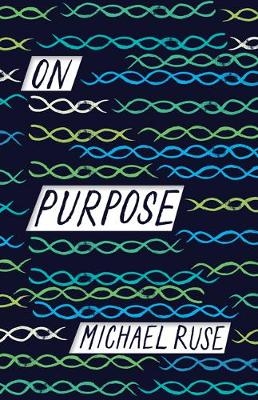
On Purpose
Seiten
2017
Princeton University Press (Verlag)
978-0-691-17246-0 (ISBN)
Princeton University Press (Verlag)
978-0-691-17246-0 (ISBN)
A brief, accessible history of the idea of purpose in Western thought, from ancient Greece to the present Can we live without the idea of purpose? Should we even try to? Kant thought we were stuck with purpose, and even Darwin's theory of natural selection, which profoundly shook the idea, was unable to kill it. Indeed, teleological explanation--w
A brief, accessible history of the idea of purpose in Western thought, from ancient Greece to the present Can we live without the idea of purpose? Should we even try to? Kant thought we were stuck with purpose, and even Darwin's theory of natural selection, which profoundly shook the idea, was unable to kill it. Indeed, teleological explanation--what Aristotle called understanding in terms of "final causes"--seems to be making a comeback today, as both religious proponents of intelligent design and some prominent secular philosophers argue that any explanation of life without the idea of purpose is missing something essential. In On Purpose, Michael Ruse explores the history of the idea of purpose in philosophical, religious, scientific, and historical thought, from ancient Greece to the present. Accessibly written and filled with literary and other examples, the book examines "purpose" thinking in the natural and human world. It shows how three ideas about purpose have been at the heart of Western thought for more than two thousand years.
In the Platonic view, purpose results from the planning of a human or divine being; in the Aristotelian, purpose stems from a tendency or principle of order in the natural world; and in the Kantian, purpose is essentially heuristic, or something to be discovered, an idea given substance by Darwin's theory of evolution through natural selection. On Purpose traces the profound and fascinating implications of these ways of thinking about purpose. Along the way, it takes up tough questions about the purpose of life and whether it's possible to have meaning without purpose, revealing that purpose is still a vital and pressing issue.
A brief, accessible history of the idea of purpose in Western thought, from ancient Greece to the present Can we live without the idea of purpose? Should we even try to? Kant thought we were stuck with purpose, and even Darwin's theory of natural selection, which profoundly shook the idea, was unable to kill it. Indeed, teleological explanation--what Aristotle called understanding in terms of "final causes"--seems to be making a comeback today, as both religious proponents of intelligent design and some prominent secular philosophers argue that any explanation of life without the idea of purpose is missing something essential. In On Purpose, Michael Ruse explores the history of the idea of purpose in philosophical, religious, scientific, and historical thought, from ancient Greece to the present. Accessibly written and filled with literary and other examples, the book examines "purpose" thinking in the natural and human world. It shows how three ideas about purpose have been at the heart of Western thought for more than two thousand years.
In the Platonic view, purpose results from the planning of a human or divine being; in the Aristotelian, purpose stems from a tendency or principle of order in the natural world; and in the Kantian, purpose is essentially heuristic, or something to be discovered, an idea given substance by Darwin's theory of evolution through natural selection. On Purpose traces the profound and fascinating implications of these ways of thinking about purpose. Along the way, it takes up tough questions about the purpose of life and whether it's possible to have meaning without purpose, revealing that purpose is still a vital and pressing issue.
Michael Ruse is the Lucyle T. Werkmeister Professor of Philosophy and Director of the Program in the History and Philosophy of Science at Florida State University. He has written or edited more than fifty books, including Darwinism as Religion, The Philosophy of Human Evolution, and The Darwinian Revolution.
Acknowledgments ix
Prologue xi
1 Athens 1
2 Jerusalem 23
3 Machines 42
4 Evolution 61
5 Charles Darwin 76
6 Darwinism 91
7 Plato Redivivus 114
8 Aristotle Redivivus 129
9 Human Evolution 153
10 Mind 166
11 Religion 195
12 The End 210
Epilogue 239
Notes 241
Bibliography 267
Index 285
| Erscheinungsdatum | 14.12.2017 |
|---|---|
| Verlagsort | New Jersey |
| Sprache | englisch |
| Maße | 140 x 216 mm |
| Gewicht | 482 g |
| Themenwelt | Geisteswissenschaften ► Philosophie ► Geschichte der Philosophie |
| Geisteswissenschaften ► Philosophie ► Philosophie der Neuzeit | |
| Naturwissenschaften | |
| ISBN-10 | 0-691-17246-3 / 0691172463 |
| ISBN-13 | 978-0-691-17246-0 / 9780691172460 |
| Zustand | Neuware |
| Haben Sie eine Frage zum Produkt? |
Mehr entdecken
aus dem Bereich
aus dem Bereich
die kolonialen Wurzeln der französischen Theorie
Buch | Hardcover (2024)
Matthes & Seitz Berlin (Verlag)
28,00 €
oder Das Leben Montaignes in einer Frage und zwanzig Antworten
Buch | Softcover (2023)
C.H.Beck (Verlag)
18,00 €


